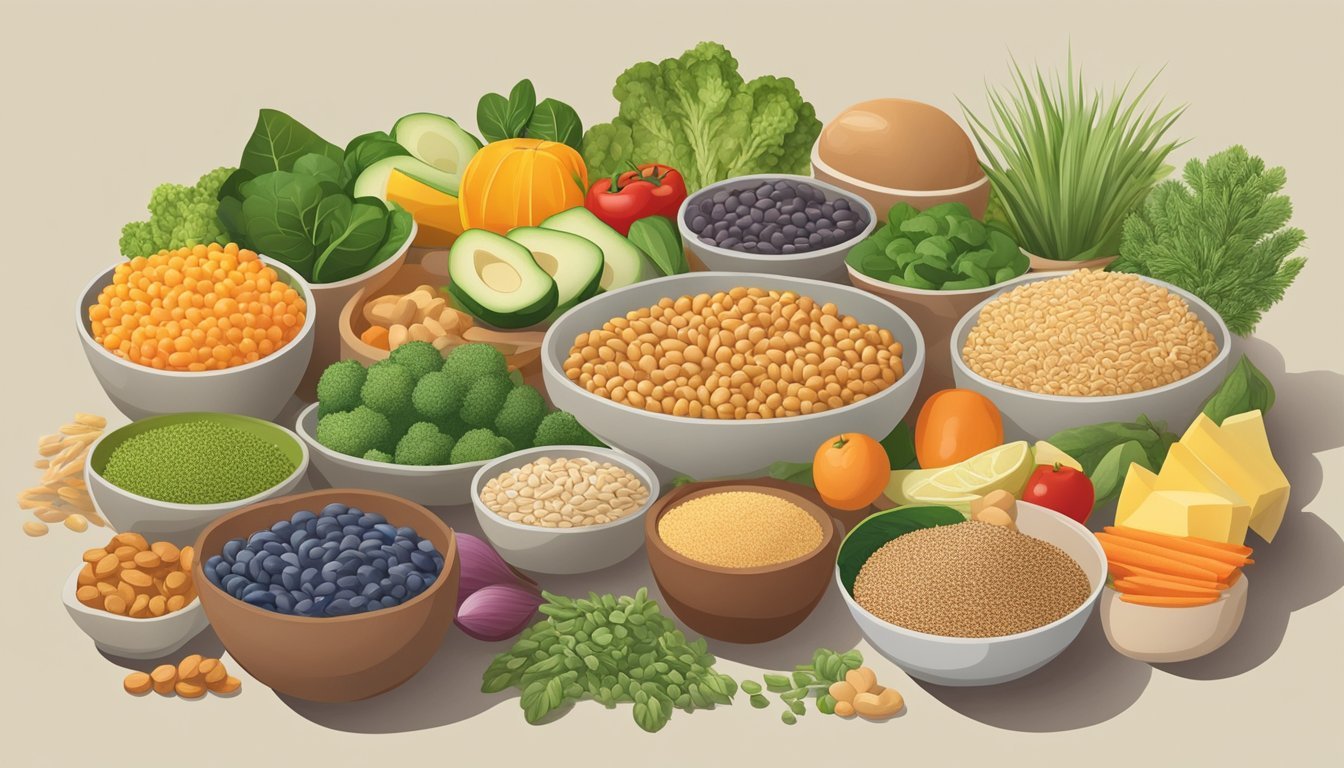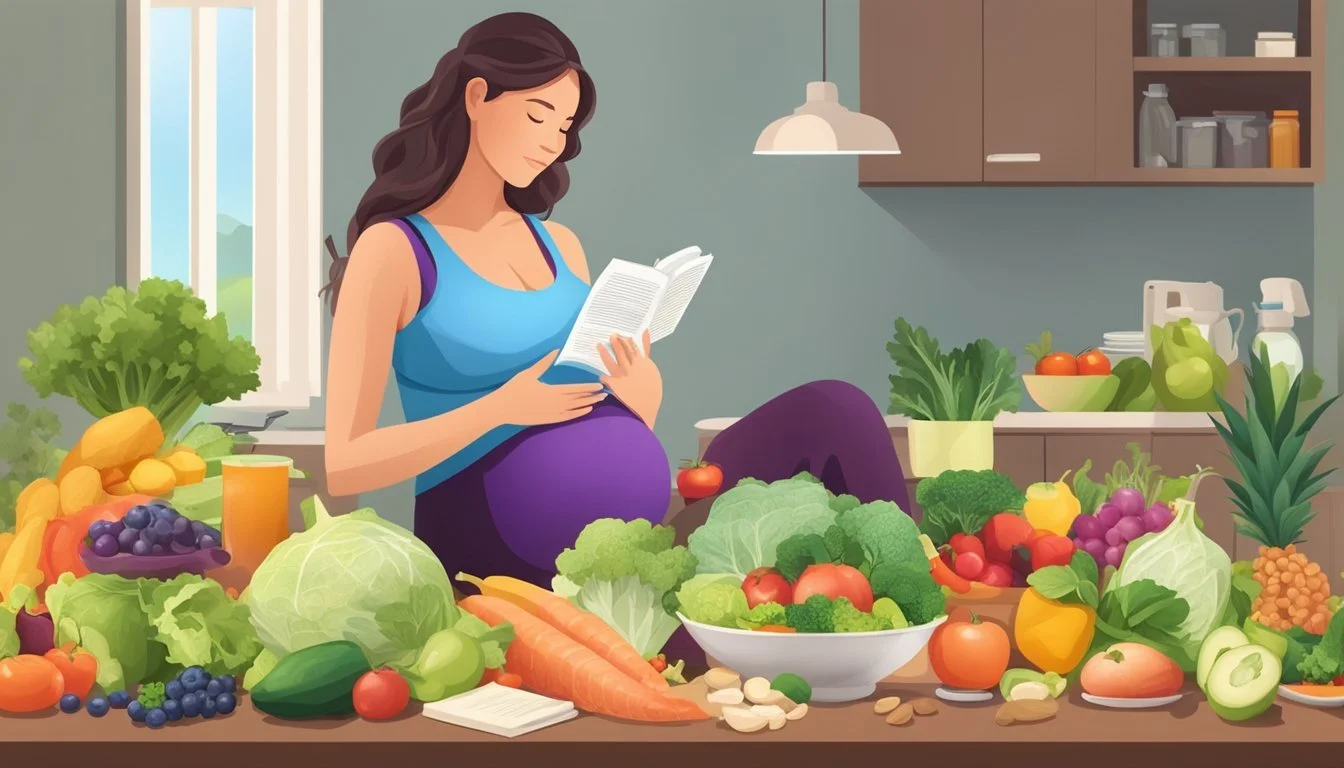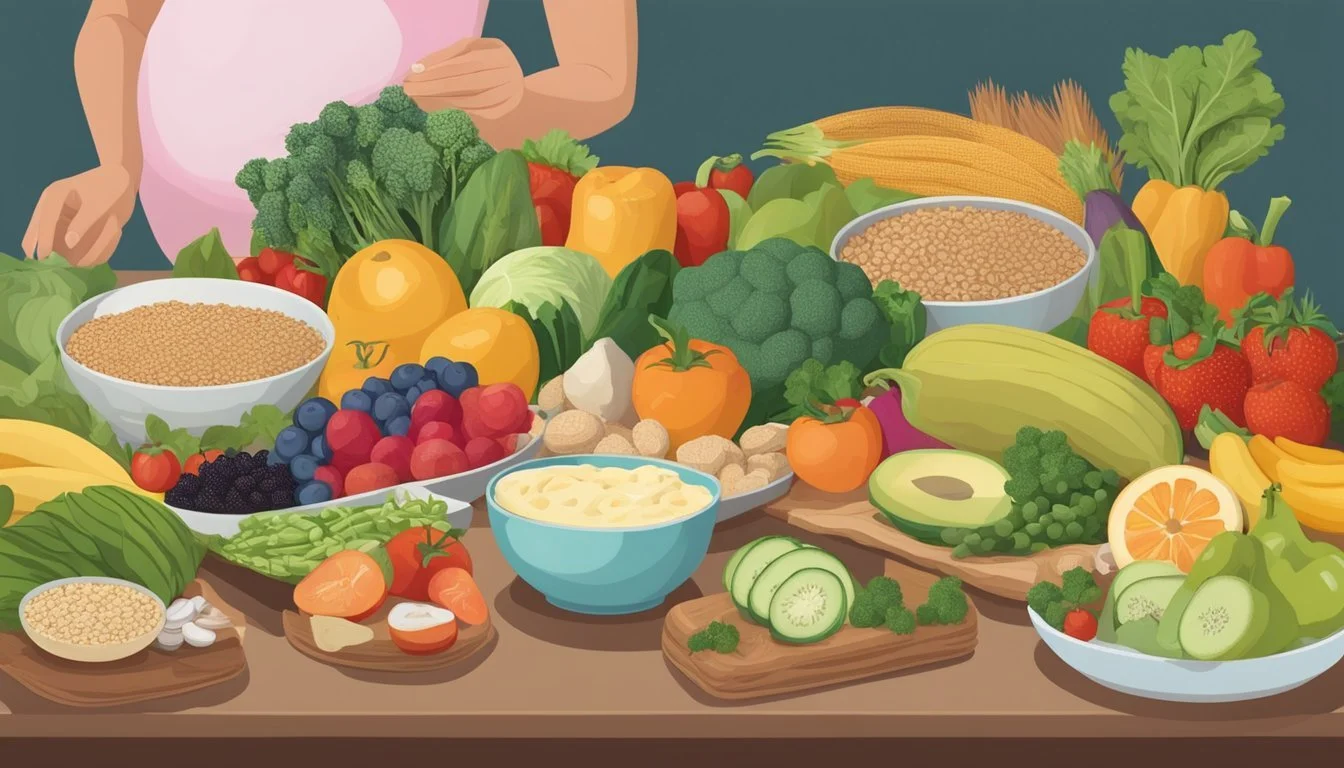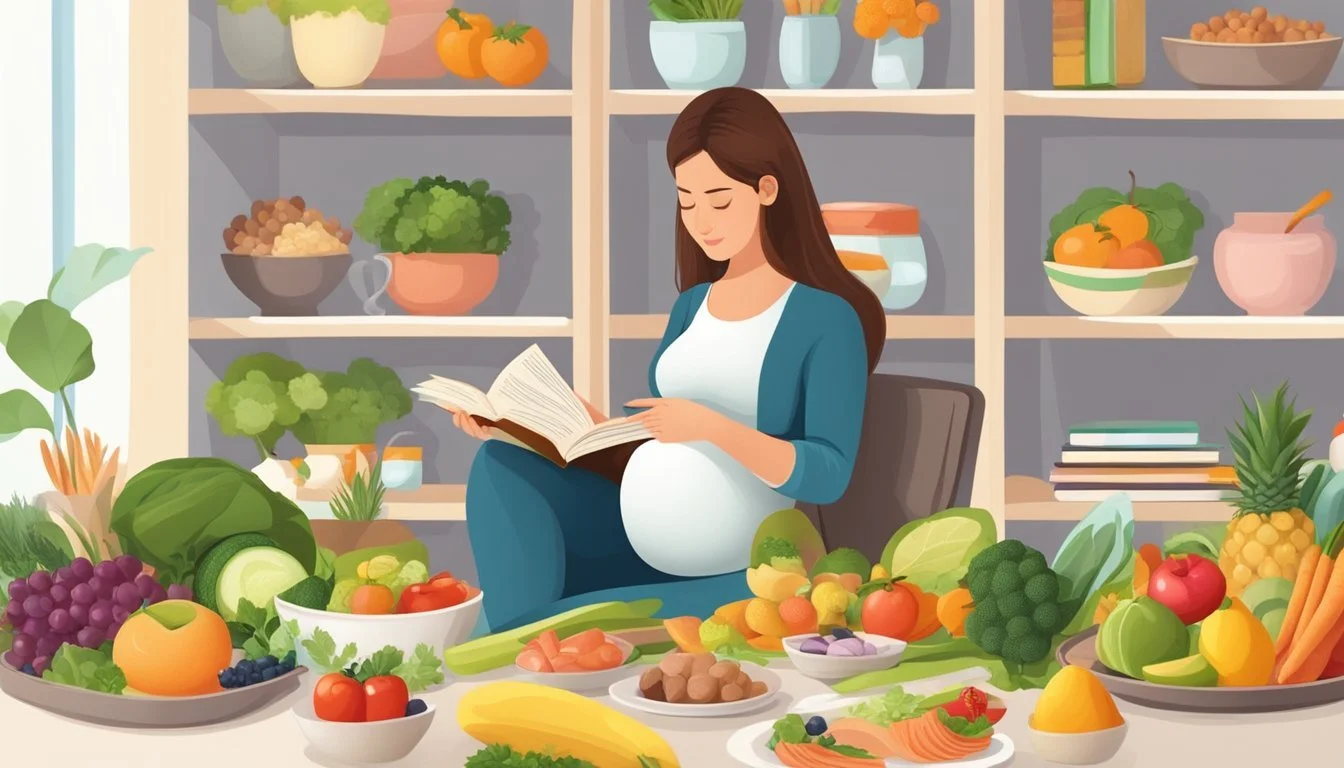Is it Safe to Follow the Ornish Diet During Pregnancy?
Understanding Nutritional Adequacy
The Ornish diet, a regimen low in fat and rich in whole plant-based foods, is heralded for its cardiovascular benefits. However, when it comes to pregnancy, the nutritional requirements shift considerably. Expecting mothers need to ensure that they are receiving adequate nutrients to support their health and the development of their fetus. While the Ornish diet is predominantly plant-based and could offer a wealth of micronutrients beneficial for both mother and child, the severe restriction of dietary fats to less than 10% of daily calories may pose concerns for a healthy pregnancy.
During pregnancy, it is crucial to maintain a balanced intake of macronutrients, which include carbohydrates, proteins, and especially fats, which play a pivotal role in the development of the fetal brain. Critical nutrients, such as omega-3 fatty acids, are derived primarily from fats and are vital during pregnancy. With the Ornish diet's limitation on fats to plant-based sources only, pregnant women might need to be particularly mindful of their dietary choices to ensure they are meeting these essential fatty acid requirements.
Nutrition during pregnancy should cater to the increased demand for certain nutrients like folic acid, iron, calcium, and protein to support the development of the baby and the well-being of the mother. While the Ornish diet encompasses a wide array of nutritionally rich foods like fruits, vegetables, whole grains, and legumes that are high in folate and other vital nutrients, adherence to any dietary plan during pregnancy should be carefully evaluated. Pregnant women should consider the potential need for adjustments in their diet or the incorporation of prenatal vitamins under the guidance of a healthcare professional to maintain a healthy pregnancy.
Overview of the Ornish Diet
The Ornish Diet, developed by Dr. Dean Ornish, is a low-fat, vegetarian eating plan designed primarily to improve heart health. It emphasizes consuming a variety of whole grains, vegetables, fruits, and plant-based proteins such as beans, legumes, and soy products. The diet encourages the intake of foods that are rich in nutrients yet low in calories and fats.
Key Components of the Ornish Diet:
Fruits and Vegetables: Unlimited intake of a wide range.
Whole Grains and Legumes: Includes oats, wild rice, quinoa, beans, and lentils.
Protein Sources: Predominantly from plants, including soy milk, tempeh, and tofu; egg whites and non-fat dairy products are permissible.
Fats in the Ornish Diet come exclusively from plant sources, with a strong focus on their quality and quantity. The plan considerably limits the intake of oils, even those traditionally considered healthy, such as olive oil. Additionally, it recommends avoiding or limiting the consumption of high-fat plant foods like nuts and seeds to maintain the total dietary fat under 10% of daily calories.
The Ornish Diet is not only concerned with dietary changes but also integrates lifestyle modifications, including regular physical activity, stress management techniques, and cessation of smoking for overall well-being. While weight loss is not the central aim, it can be a natural outcome due to its predominantly vegetarian, nutrient-rich, and calorie-conscious food selections.
Adapting the Ornish Diet for Pregnancy
The Ornish diet, primarily plant-based and low in fat, can be adapted for pregnancy to ensure both mother and baby receive essential nutrients. Pregnant women need to focus on protein, iron, calcium, and vitamins like folic acid (folate) for fetal development and their health. It is advisable to consult a healthcare provider before starting any new diet during pregnancy.
Protein: Vital for growth; include legumes, soy products such as tofu, and quinoa.
Iron: Prevents anemia; incorporate iron-rich foods like lentils, fortified cereals, and spinach.
Calcium: Supports bone health; nonfat dairy or fortified plant milk can be added.
Vitamin D: Essential alongside calcium; fortified foods or a small amount of sun exposure can be beneficial.
With careful planning, vitamin C, iodine, and omega-3 fatty acids—important for fetal brain development—can be sourced from fruits, vegetables, and flaxseeds or algae-based supplements, respectively.
Supplements and Prenatal Vitamins: Since the Ornish diet is restrictive, prenatal vitamins are recommended to fill nutritional gaps. They should contain:
Folic Acid: To prevent neural tube defects, crucial in the first trimester.
Vitamin D: Often necessary due to limited sun exposure.
Iodine: For thyroid function, especially since the diet limits iodized salt.
It's critical to achieve good nutrition during pregnancy. While the Ornish diet is heart-healthy, it may require modification:
Balanced Intake: Ensure the diet is not overly restrictive and includes a variety of nutrients.
Frequent Meals: Small, regular meals can help maintain energy levels and stabilize blood sugar.
In conclusion, while the Ornish diet is centered on healthy eating, pregnant women should tailor it to meet increased nutritional demands, often with the addition of specific supplements and fortified foods.
Important Nutrients for Pregnant Women
Pregnancy demands increased nutrition, and certain nutrients are crucial for fetal development and maternal health. This section focuses on the essential nutrients required during pregnancy and identifies dietary sources for each.
Protein Requirements
Protein supports fetal growth, breast and uterine tissue expansion, and increases in maternal blood volume. Pregnant women should aim for:
Lean meats: such as chicken, turkey, and lean beef.
Vegetarian options: including lentils, tofu, and beans.
A daily intake of 71 grams is recommended.
Iron Intake
Iron is vital for making hemoglobin, the protein in red blood cells that carries oxygen to tissues. It's particularly important in the third trimester when blood volume increases significantly.
Rich sources: liver, red meats like lamb, and lean beef.
Plant-based sources: lentils and fortified cereals.
Iron needs during pregnancy are 27 mg/day.
Calcium and Vitamin D
Calcium aids in the development of strong bones and teeth, muscle contraction, and nerve function. Vitamin D boosts calcium absorption and bone health.
Dairy staples: milk, cheese, and yogurt.
Calcium needs: 1,000 mg/day for pregnant women aged 19-50.
Vitamin D needs: 600 IU/day.
Essential Fatty Acids
Omega-3 fatty acids, particularly DHA, play a crucial role in brain and eye development.
Fish: salmon and sardines are excellent sources.
Aim for 2-3 servings of low-mercury fish per week.
Folate and Other B Vitamins
Folate is critical in preventing neural tube defects and supports DNA synthesis and cell growth. Vitamin B12 is important for maintaining the health of nerve cells.
Folate-rich foods: lentils, leafy greens, and fortified products.
Vitamin B12 sources: egg yolks, milk, and cheese.
Recommended folate intake: 600 mcg/day.
Vitamin B12 recommended intake: 2.6 mcg/day.
Foods to Emphasize
When following the Ornish diet during pregnancy, it's crucial to prioritize whole foods that are nutrient-dense to support both maternal health and fetal development. The diet emphasizes plant-based foods, including whole grains, fruits and vegetables, and legumes and beans.
Whole Grains
Whole grains are a key component of the Ornish diet and provide essential nutrients such as fiber, B vitamins, and iron which are particularly important during pregnancy. Pregnant women are advised to include:
Oats: Can be eaten as porridge or added to smoothies.
Wild Rice: A nutritious alternative to white rice.
Quinoa: A complete protein source, containing all nine essential amino acids.
Including whole grain bread as part of a balanced diet can also contribute to the necessary caloric intake while providing sustained energy.
Fruits and Vegetables
A variety of fruits and vegetables are crucial for providing vitamins, minerals, and fiber:
Citrus fruits: Excellent sources of vitamin C. Include options like oranges and grapefruits.
Broccoli: High in folate, essential for preventing birth defects.
Bananas and Pears: Perfect for snacking and rich in potassium and fiber, respectively.
Fruits and vegetables should be consumed in abundance for their antioxidants and phytonutrients, which can help support the immune system.
Legumes and Beans
Legumes and beans are important for their protein and iron content; both are needed in higher amounts during pregnancy:
Lentils: Can be added to soups or salads for a protein boost.
Beans: Varieties like black beans and kidney beans are versatile and can be included in many dishes.
Peas: A sweet addition to meals that also provides additional fiber and protein.
These plant-based proteins are also accompanied by beneficial fiber, which can help maintain digestive health during pregnancy.
Foods to Limit or Avoid
When following the Ornish diet during pregnancy, it's crucial to consider both the diet's restrictions and the dietary needs of pregnancy. Pregnant women must pay special attention to avoid certain foods that could pose risks to their health or the health of their fetus.
Caffeine and Alcohol
Pregnant women should limit caffeine intake to no more than 200 milligrams per day, which is roughly the amount in one 12-ounce cup of coffee. They should eliminate alcohol completely, as it can lead to fetal alcohol spectrum disorders and other developmental issues.
High-Mercury Seafood
Consumption of high-mercury seafood such as swordfish, shark, and marlin should be avoided due to the risk of mercury poisoning, which can adversely affect the baby’s developing nervous system. Pregnant women are advised to limit their seafood consumption to choices low in mercury such as salmon and trout.
Unpasteurized Dairy and Soft Cheeses
Products like unpasteurized dairy and soft cheeses, including feta and brie, should be avoided due to the potential for listeria contamination. Listeria can lead to food poisoning and serious complications during pregnancy, such as miscarriage or stillbirth.
Processed and Junk Foods
The Ornish diet already restricts fat intake, particularly from unhealthy sources. Pregnant women should avoid processed and junk foods like chips and sushi made with raw fish, which are not only high in unhealthy fats and empty calories but may also pose risks of food poisoning.
Managing Weight Gain During Pregnancy
During pregnancy, managing weight gain is crucial for the health and development of both the mother and the baby. The Institute of Medicine provides guidelines for weight gain based on a woman's pre-pregnancy Body Mass Index (BMI). Here are the recommended ranges:
Underweight (BMI below 18.5): 28-40 pounds
Normal weight (BMI 18.5-24.9): 25-35 pounds
Overweight (BMI 25-29.9): 15-25 pounds
Obese (BMI 30.0 and above): 11-20 pounds
Healthy Eating is a cornerstone for managing weight. It involves a balanced diet consisting of fruits, vegetables, whole grains, lean proteins, and healthy fats to support the growth of the fetus and the well-being of the mother. Caloric intake should increase modestly; however, it's not necessary to "eat for two."
The development of the baby, particularly in the second and third trimesters, may rely on consistent and adequate maternal weight gain. During these critical periods, the baby grows the most, necessitating optimal nutrition.
Growth trends should be monitored regularly by a healthcare provider, as too much or too little weight gain can pose risks, including gestational diabetes, hypertensive disorders, or inadequate fetal growth.
Pregnant individuals should discuss their weight gain goals with a healthcare provider, especially when following specific diets like the Ornish diet, to ensure they're meeting nutritional needs without compromising fetal development or individual health.
Pregnancy Complications and Diet
The dietary choices a pregnant person makes can significantly affect their risk of experiencing common pregnancy complications. A balanced diet tailored to an individual's health needs should be discussed with a healthcare provider.
Constipation
Constipation is a frequent issue during pregnancy due to hormonal changes and reduced gastrointestinal motility. A high-fiber diet including whole grains, fruits, and vegetables can mitigate this problem. Wheat bran, a particularly effective fiber source, may be incorporated into the diet. Pregnant individuals are often advised to increase their water intake along with fiber to aid digestion and reduce constipation.
Gestational Diabetes
Gestational diabetes (GD) is a condition characterized by high blood sugar during pregnancy. A diet low in refined sugars and rich in complex carbohydrates can help manage blood sugar levels. A health professional may recommend a dietary plan that limits excessive carbohydrate intake and encourages a balance of protein, fiber, and healthy fats. Regular monitoring and dietary adjustments are crucial for managing GD.
Food-Borne Illness
Pregnant individuals are at increased risk for food-borne illnesses due to a naturally suppressed immune system. To avoid infection, it is essential to consume properly cooked and pasteurized foods. Foods to be cautious with or avoid include:
Raw or undercooked eggs and meats
Unpasteurized dairy products and juices
Soft cheeses such as feta or brie unless they are clearly labeled as pasteurized
Practices such as frequent handwashing, keeping raw and cooked foods separate, and following food safety guidelines can also reduce the risk of food-borne illness.
Considerations for Lactation and Postpartum
When transitioning into the postpartum period, women's nutritional needs are paramount, especially if they are breastfeeding. Healthy eating should continue to accommodate the increased demands of lactation. The Ornish diet, characterized by its low-fat and plant-based approach, could potentially influence milk composition and maternal nutritional reserves, so certain modifications may be warranted.
Nutritional Adequacy: The Ornish diet, while emphasizing heart-healthy principles, may necessitate additional attention to ensure sufficient caloric and nutrient intake for lactating mothers. It is generally recommended for nursing mothers to consume an extra 330 to 400 kilocalories per day to support milk production.
Key Nutrients:
Calcium: Critical for skeletal health in mother and child.
Iron: Important for red blood cell production and preventing anemia.
Vitamin B12: Vital for nervous system health, often supplemented in plant-based diets.
Breast Milk Quality:
Essential fatty acids, particularly omega-3s, should not be neglected as they are crucial for the infant's brain development and may be less prevalent in a low-fat diet like Ornish's.
Variety and Balance:
Incorporating a variety of whole foods can ensure a spectrum of nutritional needs are met, proactively supporting both mother and child's health. Emphasizing legumes, whole grains, and a range of fruits and vegetables can aid in this effort.
In practice, women should consult healthcare providers to personalize their diet during lactation. A registered dietitian can offer tailored advice, ensuring that postpartum nutrition and breastfeeding are supported by a diet that aligns with the Ornish principles while also adapting to the heightened nutritional requirements of this life stage.
Consulting Health Professionals
When considering the Ornish diet during pregnancy, it is imperative to seek the guidance of a qualified health professional. They are equipped to provide personalized advice that takes into account individual health status and nutritional needs during this critical period.
Obstetricians and dietitians typically recommend that pregnant individuals adhere to Dietary Guidelines for Americans, ensuring balanced nutrition that supports fetal development and maternal health. A health professional can evaluate whether the low-fat, plant-based principles of the Ornish Diet align with these guidelines for a specific patient.
Pregnant individuals may require special nutritional supplements such as prenatal vitamins. Health professionals often advise on appropriate prenatal multivitamins that contain essential nutrients, including folic acid, iron, calcium, and DHA. These are crucial for preventing birth defects and promoting healthy pregnancy outcomes.
A structured approach to prenatal nutrition typically includes:
Adequate calorie intake: Pregnant women need additional calories. A professional can provide specific caloric targets.
Balanced macronutrients: While the Ornish Diet is low in fat, professionals can determine the appropriate intake of fats, proteins, and carbohydrates.
Vitamin supplementation: Tailored advice on prenatal multivitamins to mitigate the restricted intake of certain nutrients due to diet limitations.
Health professionals will consider medical history and potential diet-related risks to ensure both the pregnant individual and the developing fetus receive optimal nutrition.
In summary, consulting a health professional is essential when following any specialized diet, including the Ornish Diet, during pregnancy. They help ensure that dietary practices contribute to a healthy pregnancy and do not compromise maternal or fetal well-being.
Additional Resources
When navigating dietary choices like the Ornish diet during pregnancy, it is crucial for expectant mothers to ensure that they are receiving all necessary nutrients for a healthy pregnancy and fetal development. These resources can provide guidance and tools to monitor health and progression throughout pregnancy.
Pregnancy Nutrition Guides
Nutrition guides offer comprehensive advice on essential nutrients that support the nervous system and prevent neural tube defects. Key nutrients include folic acid for brain development and calcium for bone growth. They typically cover:
Essential Nutrients: Lists and explanations of nutrients vital for fetal development.
Diet Plans: Possible meal plans that ensure balanced intake of proteins, vitamins, and minerals.
Supplement Recommendations: Information about prenatal vitamins and their role in a healthy pregnancy.
Pregnancy Due Date Calculator
Due date calculators assist expectant mothers in tracking their pregnancy timeline, which is important for monitoring development milestones. They often feature:
Estimated Due Date: Calculation based on the last menstrual period or conception date.
Development Milestones: Information on fetal development stages throughout pregnancy.
Personalized Timelines: Customized overview of what to expect in each pregnancy trimester.










